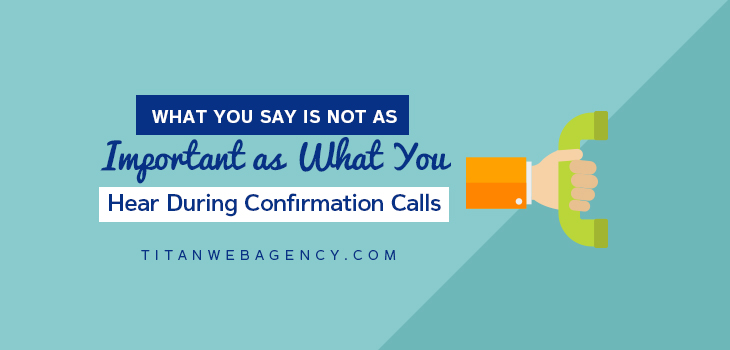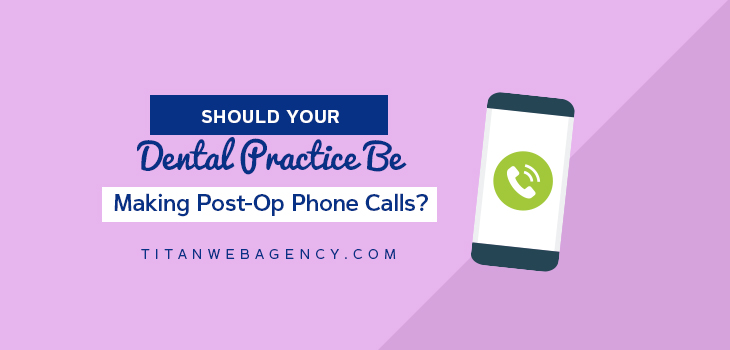What You Say Is Not as Important as What You Hear During Confirmation Calls

How do you get patients to show up to their appointments? Many dentists and teams think that what is said during the confirmation call makes the difference in decreasing cancellations and no-shows. I am asked all the time for confirmation call scripts – I’m against scripts because they simply don’t work.
The problem with a script is that people know when you are reading from a script, and it doesn’t sound genuine. If the patient doesn’t answer using one of the multiple-choice options given, it leaves the employee with no response because they are following a script – not their own intuition.
Cover certain points during confirmation calls and do everything possible to get the patient to attend their appointment.
It is important that the employee understands their intention with the call. When making confirmation calls, the intention is not to get the calls done as quickly as possible or finish them and get them out of the way for the day. The confirmation call intends to ensure the patient arrives or finds out sooner rather than later if they do not plan to come at all. To do that, the person doing the confirmation call must understand their importance and be well-trained on how to make these calls. They need to know acceptable reasons to cancel, what to look for in the patient’s cancellation history, and the office cancellation policy.
Listen to this blog post:
Follow these basic guidelines before ever making a confirmation call:

- Call well enough in advance to ensure the patient has adequate time to move the appointment if they have not confirmed already. I suggest at least 48 hours before their appointment.
- Be confident in your tone of voice and not distracted by other things going on around or in front of you. The focus needs to be on that call, and the intention is to ensure the patient intends to come to the appointment.
- It is important to confirm the day and time correctly with the patient and if multiple appointments are scheduled on the same day, that is noted in the call. I have seen too many distracted employees accidentally say the wrong day or time – a lack of attention to detail can create a hole in the schedule.
- Tell the patient you are calling to confirm or remind them of the day and time of their appointment, and then shhhhhh – listen to the patient’s response. Do they seem confident they are coming, are they paying attention to you, and don't seem otherwise distracted, do they give you any concern with their response that they may not make it? If so, question a little more. As much as we don’t want them to cancel or move their appointment, it is better to know in advance rather than wait until the last minute.
- If necessary, call multiple times and use multiple technologies, such as text messages or emails, to confirm the appointment. Many people don’t answer their phone, but they will text back. Some people require multiple reminders to attend. It is important to know your patients and do what is necessary to get them to arrive for their appointment.
It is important to point out that how the confirmation call is made will not fix your cancellation and no-show problem. Learning to do them well is a necessity, so you know you have done everything possible to get that patient to arrive. However, what happens when that patient responds is most important.
Your team has to change the bad habits we have allowed your patients to start in the dental office, which is to allow them to cancel or no-show. If you have continually allowed your patients to cancel at the last minute, only to reschedule them again, then have them cancel again, and so on, you have created a culture that makes cancellations acceptable. If you want to build a schedule of patients that show up, it is not about what we say in the confirmation call, but, more importantly, what we say the next time they try to cancel. Make your policy firm and work to re-train your patients so they know they can’t keep canceling, or you will not allow them to reschedule again, or at least only be able to book same-day appointments.















